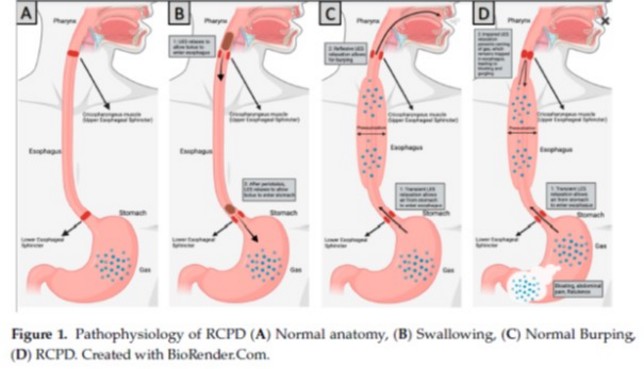(RCPD, Retrograde CricoPharyngeus Dysfunction)
Rare disease characterized by the inability to burp. Some patients are also unable to vomit, or are only able to do so with great difficulty. It is caused by a lack of relaxation of the upper esophageal sphincter (cricopharyngeal muscle) when there is an increase in pressure in the esophagus: the muscle relaxes normally during swallowing, but the reaction to pressure in the esophagus is absent.
Onset generally observed in adolescence, but sometimes as early as infancy.
Other complaints :
- frequent bloating, even severe abdominal distension
- gurgling” noises from the throat and thorax
- frequent flatulence
- poor tolerance of carbonated drinks.

(source: J Clin Med 2024;13:413)
Diagnosis: esophageal manometry
Treatment : Injection of botulinum toxin into the cricopharyngeal muscle (endoscopically) under general anesthesia or transcutaneously (EMG-guided). Direct effects last on average three months. The effects of the injection may extend beyond the first three months. 30 % of patients report swallowing problems after the injection, which generally subside after 3-4 weeks.
If injection proves ineffective, endoscopic dilatation or partial myotomy of the cricopharynx are alternatives.
Anesthetic implications:
gastric dilatation, abdominal distension
References :
- Bastian RW, Smithson ML.
Inability to belch and associated symptoms due to retrograde cricopharyngeus dysfunction: diagnosis and treatment.
OTO Open 2019 ; DOI: 10.1177/2473974X19834553
- Miller ME, Lina I, Akst LM.
Retrograde cricopharyngeal dysfunction : a review.
J Clin Med 2024;13:413. doi.org/10.3390/jcm13020413
Updated: March 2025